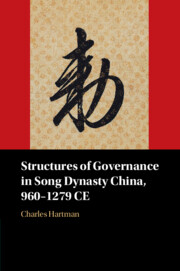Book contents
- Structures of Governance in Song Dynasty China, 960–1279 CE
- Structures of Governance in Song Dynasty China, 960–1279 CE
- Copyright page
- Contents
- Figures
- Tables
- Preface
- Notes on the Cover and on the Text
- Introduction
- Part I Dual Faces of the Song State
- Part II The Technocratic and Confucian Models of Governance
- Part III Interactions
- 9 What Zhu Xi Told the Emperor
- 10 “Us against Them”: The Southern Song, 1162–1182
- 11 Deeper Structures of Song Governance
- Epilogue
- Appendix of Senior Administration Positions, 1162–1182
- Bibliography
- Index
9 - What Zhu Xi Told the Emperor
from Part III - Interactions
Published online by Cambridge University Press: 30 March 2023
- Structures of Governance in Song Dynasty China, 960–1279 CE
- Structures of Governance in Song Dynasty China, 960–1279 CE
- Copyright page
- Contents
- Figures
- Tables
- Preface
- Notes on the Cover and on the Text
- Introduction
- Part I Dual Faces of the Song State
- Part II The Technocratic and Confucian Models of Governance
- Part III Interactions
- 9 What Zhu Xi Told the Emperor
- 10 “Us against Them”: The Southern Song, 1162–1182
- 11 Deeper Structures of Song Governance
- Epilogue
- Appendix of Senior Administration Positions, 1162–1182
- Bibliography
- Index
Summary
Chapter 9, “What Zhu Xi Told the Emperor,” begins Part III of this book and transitions from constructing the technocratic–Confucian continuum model to applying that model to analyze the first twenty years of the reign of Emperor Xiaozong 孝宗 (1127–1194; r. 1162–1189). This chapter presents a close reading of memorials by Zhu Xi 朱熹 (1130–1200) to Emperor Xiaozong that critique his regime as a polity divided literally into “two states – us against them.” The alliance that Zhu Xi claims as his own consists of activist Confucian officials, whose senior leaders are jinshi graduates from a variety of regional centers of literati culture. Many are daoxue (Learning of the Way) scholars and support the movement’s political agendas. As their nemesis, Zhu Xi describes powerful coalitions led by officials he calls “the close” (jinxi 近習), literally “the near and familiar,” often equated to the court “favorites” of Western tradition. The term refers to officials whose careers derive from their close physical proximity to the emperor; these might be personal retainers, family, affinal kinsmen, or eunuchs. They are capital residents without jinshi degrees, or with jinshi decrees conferred by imperial decree. These connections afforded them both formal and informal access to the inner court bureaucracy.
Keywords
- Type
- Chapter
- Information
- Structures of Governance in Song Dynasty China, 960–1279 CE , pp. 265 - 277Publisher: Cambridge University PressPrint publication year: 2023



